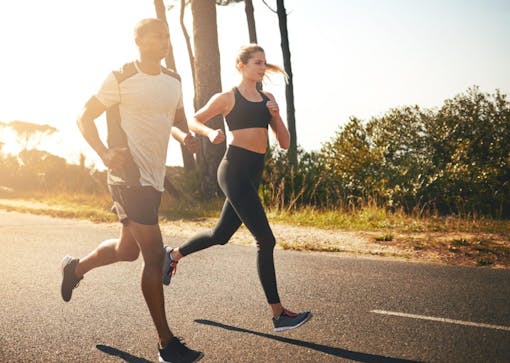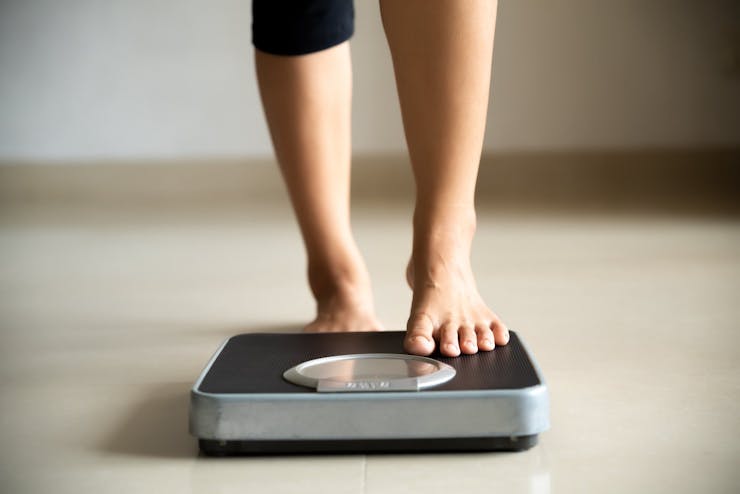Weed is well known for its ability to give you the munchies, so it might seem paradoxical that the plant could help us lose weight. Yet research suggests that cannabis users are significantly less likely to be obese than non-users, and adult-use cannabis legalization may even be linked to lower obesity rates in some states. Cannabis may also help with metabolic regulation and stress management, and maximize physical exertion during workouts.
Let’s explore how weed may contribute to weight loss and take a look at the cannabinoids that play a primary role in influencing appetite. But before you make any lifestyle changes with the goal of losing weight, we recommend speaking with your primary care physician or dietitian, as we cannot provide medical advice.
How does weed help you lose weight?
It might surprise you to find out that cannabis and cannabinoids can help you in your weight loss journey, despite the stereotype that stoners are lazy and frequently get the munchies. Scientists were surprised, too—the discovery that cannabis use correlates to weight loss was accidental. Researchers set out to learn about the effects of weed on glucose levels, cardiovascular risk, epilepsy, or chronic illness, and in the process, found that weed may also help people regulate their metabolism and potentially lose weight.
Could lower BMI
According to a 2018 research review, 17 studies indicate that overall, cannabis users show lower body mass indexes (BMIs) than non-users. BMI is a measure of body fat based on height and weight that applies to adult men and women. Across all the studies, the mean BMI of cannabis users was approximately 3 lbs lower than non-users.
One study even found that the frequency of cannabis use was inversely correlated with BMI—which means that using weed more often has some correlation to a lower BMI. Keep in mind, BMI does not accurately reflect a person’s activity level or ratio of body fat compared to muscle and their physical build, and many medical professionals consider it an outdated health metric.
Other research shows that rates of obesity are lower for frequent cannabis users and even more casual consumers—despite the fact that cannabis users consume more calories than non-users (perhaps thanks to the munchies). Cannabis users consume an average of 834 more calories a day than non-users, according to the review above.
Regulates metabolism & calorie intake
Scientists have floated the idea that cannabis may also help regulate metabolism to help those who are both underweight and overweight achieve stasis. The endocannabinoid system plays a fundamental role in regulating appetite and metabolism, as well as how our bodies store energy.
Shop highly rated dispensaries near you
Showing you dispensaries nearMost Western diets are rich in omega-6 fatty acids but deficient in omega-3s, which can overstimulate CB1 receptors, which help regulate numerous bodily functions from their locations in our brains, including contributing to inflammation and spiking weight gain.
Suppresses appetite
Other data look specifically at the role of cannabinoids on eating patterns. While THC, the main intoxicating cannabinoid in weed, fires up appetite and makes food more appealing, other cannabinoids such as CBD and THCV (you may know it as the “diet weed” cannabinoid) appear to dial it back.
A 2022 review suggests that CBD might help reduce appetite and increase feelings of fullness. In one of the reviewed studies, participants who received CBD also experienced a drop in BMI after treatment.
Overall, lower doses of CBD appeared to lead to small reductions in appetite, while larger doses led to more significant appetite suppression. In rodent studies, THCV has been shown to lower appetite, promote feeling of fullness, and stimulate metabolism. In human studies, THCV can improve glucose control, which can also support weight loss.
Stress management
A huge factor that can impact our weight loss journey is stress. When we’re stressed out, our body produces cortisol, a hormone that triggers a release of glucose into our bodies and brains and minimizes other body functions that might not serve us in a fight-or-flight situation. Back in the early days of humanity, this was a great way to help us escape predators or survive harsh conditions.
But life’s primary stressors have changed a lot, and most people in the 21st century aren’t flooding their bodies with adrenaline to outrun a bear or outwit wolves.
But under chronic stress, our bodies begin to break down. We can’t focus, engage, perform, or even digest our food as well. And if our bodies aren’t digesting properly, they aren’t metabolizing our food and supporting our exercises either. Some researchindicates that cannabis use, particularly high-THC cannabis, affects how our bodies react to cortisol, but it isn’t enough to conclude anything about its weight-loss impact.
Helps promote sleep and exercise

Anecdotally, cannabis users report that weed can support weight loss in other ways.
Donna Shields, a registered dietician, nutritionist, and co-founder of the Holistic Cannabis Academy, said that cannabis may support one’s weight loss journey by helping shift to a healthier lifestyle. With improved overall well-being, weight loss can come more easily. She emphasized that cannabis shouldn’t be used as a silver bullet for weight loss, but as an aid.
“For example, if you’re not getting enough sleep or poor quality sleep, this triggers the hormone ghrelin, which influences hunger and how fat gets deposited in the body,” explained Shields. “If cannabis can help with sleep, then you’re helping to resolve the weight gain issue. I can’t underscore enough how poor sleep contributes to poor weight management.”
Shields also added that by mitigating pain, cannabis can help people with pain-related issues become more active—thus helping with weight loss goals.
“A holistic approach will achieve wellness faster than popping a gummy and calling it a day,” she said. “Meditation, movement of any type, a cleaned-up diet… all of these things are critical. It’s a multi-disciplinary approach that gets the best results.”
A 2022 review indicated that both THC and CBD were beneficial in helping subjects fall asleep and stay asleep. Sleep allows our bodies and functions, including metabolism, to recharge and keep performing optimally through the following day.
How to use cannabis for weight loss
Weight loss is a personal choice, which means that whatever your plan is, it needs to be right for your specific needs and medical history—both of which are important to discuss with your doctor before determining the best plan.
If you’re contemplating adding cannabis to your weight-loss plan, you can use isolated and novel cannabinoids, incorporate cannabis into your exercise regime, helping you sleep better and putting you in a better mindset for committing to your health goals.
Keep in mind cannabis is not a magical solution for weight loss, and isn’t guaranteed to make you lose weight. Consult your health care provider for medical advice before you make any drastic lifestyle changes.
Choose novel cannabinoids
Unfortunately, THC is most likely the culprit for the munchies, so high-THC strains might pose a conflict for regular cannabis users to curb cravings. Cannabinoids like CBD and THCV have shown to have unique effects on appetite and metabolism, which can help you hone in on your health goals. See our new list of the best strains that don’t give you the munchies.
Get regular exercise
Diet and eating patterns play big roles in our fitness and weight loss journeys, but so does exercise. Regular movement, even if it’s just a short walk away from your office and/or desk every day, goes a long way in keeping your body running right and feeling fit. Cannabis can help you get up and off to the gym, or relieve your body of soreness after a long hike or workout class.
Maintain a healthy diet
You’ve probably heard this your whole life: Eat your vegetables! Eating a balanced diet of the food groups and avoiding too much sugar and processed foods will help you live a long life free of maladies. It’s okay to indulge in your cravings from time to time, but unfortunately, we have to agree that you need to eat your greens as well as smoke them. A healthy diet can still taste delicious and hit all the right notes—in fact, cannabis and healthy eating go hand in hand.
Consult a primary care or medical marijuana doctor
While all of us here at Leafly love weed and looking into the evolving research around it, we aren’t licensed medical professionals and cannot make any recommendations from a medical standpoint. Consult your primary care doctor or a local doctor familiar with cannabis and its relationship to health for individualized medical advice.

Does weed increase metabolism?
It’s hard to say if consuming weed consistently can speed up a person’s metabolism. Based on the research compiled and reviewed in this article, there is a correlation between cannabis, metabolism, and weight loss, but no firm evidence of causation.
Why can weed help some people lose weight?
The beauty and benefits of cannabis often never come in isolation, and everyone’s relationship with their own weight is highly personal. When it comes to weight loss, a physical process that covers multiple health factors like diet, exercise, sleep, and stress, so does cannabis work in many ways that can support those goals.
Since weed does not have any inherent weight loss properties, we can’t guarantee that using cannabis will affect your weight or metabolism. Weed can make the process easier, perhaps, but only you can make the changes necessary to achieve your goals.
Are there any calories in weed?
Short answer, it depends on your consumption method. Smoking, vaping, and/or dabbing weed are all inhalation methods that do not require you to ingest cannabis or engage your digestive system, so you won’t be intaking any calories while puffing and passing. But if you want to eat a gummy, cookie, or a homemade cannabis treat, the food ingredients will contain calories. If you don’t want to inhale cannabis but want to avoid calories, opt for a tincture, capsule or pastille.
Why do some people gain weight when they smoke weed?
No two people have the same experiences with cannabis or weight loss. It’s hard to hear, but just because cannabis can help you lose weight doesn’t mean it will lead to weight loss. Some people may find that they eat more when they smoke or consume weed, and do not maintain their normal level of physical activity, which can lead to weight loss.
Other pre-existing conditions can also impact weight loss or weight gain. Your doctor has access to all the personal information needed to determine if cannabis is impacting your weight loss or fitness journey.
Key takeaways about using weed for weight loss
Weed has many amazing qualities, but none of them can make magic happen or compensate for choices we make that go against our goals, whatever they may be. Cannabis can help you embark and stay on your weight loss journey, but it will not, by itself, cause you to drop weight. If you want to incorporate weed into your health journey, here are the best ways:
- Experiment with cannabis strains and/or products with different cannabinoids and ratios that
- Use cannabis to help you set a routine with your sleep, which sets you up for a successful next day exercising or eating healthily.
- Stress can thwart even the best of intentions. Address the stress, and the rest will follow.
Amelia Williams contributed to this updated report.
Sources:
https://www.leafly.com/news/lifestyle/the-stoner-diet-eating-healthy-while-high
https://www.cannamd.com/why-does-marijuana-make-you-lose-weight/
https://pubmed.ncbi.nlm.nih.gov/36073115/
https://pubmed.ncbi.nlm.nih.gov/23684393/
https://www.ncbi.nlm.nih.gov/pmc/articles/PMC7977484/
https://pubmed.ncbi.nlm.nih.gov/26965714/
https://www.ncbi.nlm.nih.gov/pmc/articles/PMC9067069/
https://www.leafly.com/news/health/can-cannabis-help-your-workout
https://www.mayoclinic.org/healthy-lifestyle/stress-management/in-depth/stress/art-20046037
https://link.springer.com/article/10.1007/s40261-022-01205-y
https://www.ncbi.nlm.nih.gov/pmc/articles/PMC9525229/
https://www.ncbi.nlm.nih.gov/pmc/articles/PMC6340377/
https://www.leafly.com/news/health/why-does-weed-give-you-munchies
https://pubmed.ncbi.nlm.nih.gov/12442909/
https://pubmed.ncbi.nlm.nih.gov/20936991/
https://pubmed.ncbi.nlm.nih.gov/27573936/
https://www.ncbi.nlm.nih.gov/pmc/articles/PMC4204468/
https://www.ncbi.nlm.nih.gov/pmc/articles/PMC6174415/
https://www.frontiersin.org/articles/10.3389/fpsyg.2021.687106/full





